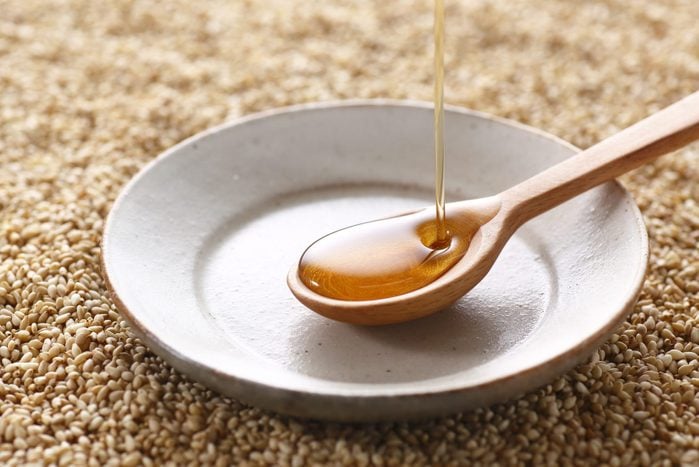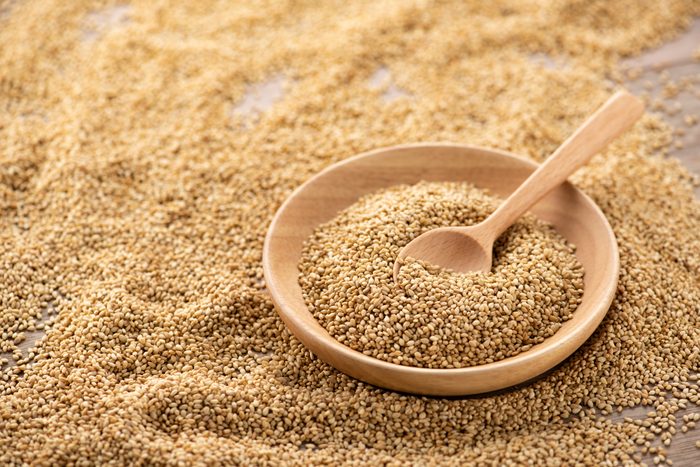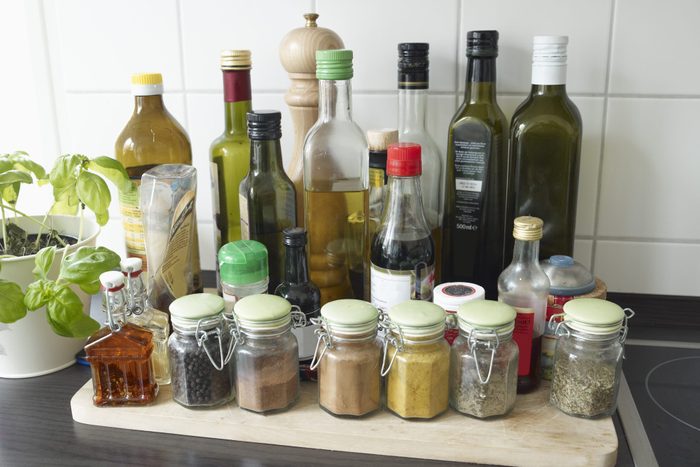
Sesame oil 101
Even if you’re not eating a completely plant-based diet, chances are you’re looking for new ways to add flavor to your favorite roasted veggies, stir-fries, and salad dressings.
If you haven’t tried sesame oil yet, you might be pleasantly surprised.
And you have your choice between sesame oil, primarily used for cooking, and toasted sesame oil. The latter is darker and has a yummy nutty flavor. It’s pretty potent, so it’s most often used as a condiment.
Here’s a closer look at sesame oil nutrition, the smoke point and how to use it for cooking, and the health benefits

Where does sesame oil come from?
The sesame plant is just over three feet tall, but it sure yields a wealth of uses. It thrives in hot and dry conditions. The top three sesame seed oil growing countries are China, Myanmar, and India.
The elongated pods that grow on plants hold the coveted edible seeds. During harvest time, the stalks are bundled, and the seeds are hulled and cleaned from the pods. From there, they go through an electronic sorter.
The seeds that are off-size or immature are used for sesame oil production. The toasted variety is pressed from roasted sesame seeds, giving it a darker color and nutty flavor.
Seeds pressed into oil without using heat are sold as “sesame oil.” This lighter-colored variety is relatively bland and often used for salad dressing or cooking.

What is sesame oil used for?
Sesame seeds have a myriad of possibilities once they leave the seed pod. Besides sesame oils, the seeds are a tasty topping for everything from salads to breads.
Sesame oil is also in perfumes, cosmetics, creams, lubricants, insecticides, fungicides, and solvents for intramuscular injections.

Sesame oil nutrition
Fats come in different varieties. Some are better (or worse) for our health. So when it comes to cooking oils, the first thing most of us ask is how bad is it for you?
The good news is sesame oil is rich in “heart healthy” polyunsaturated and monounsaturated fats and low in saturated fats.
Still, too much of a good thing applies with sesame oil. One tablespoon is 120 calories.
Here’s some notable nutrition facts for one tablespoon of sesame oil, according to the USDA’s Food Composite Database.
Calories: 120
Saturated fats: 1.93 grams
Monounsaturated fats: 5.4 grams
Polyunsaturated fats: 5.67 grams
Vitamin E: 0.19 milligrams
Vitamin K: 1.85 micrograms

Sesame oil may help improve heart health
About that heart health—sesame oil contains a pretty balanced ratio of omega-3, omega-6 (polyunsaturated), and omega-9 (monounsaturated) fatty acids.
Research in Nutrition Journal found that a diet containing these healthy fats lowers your risk of developing heart disease. Sesame oil may also help improve clogged arteries, which can lead to heart disease.
In a 2018 study published in Nature’s Scientific Reports, mice were treated with sesame oil for 30 days and later fed a high-fat diet. The mice developed less plaque buildup compared to the mice who didn’t receive sesame oil extract.
Another small study in the International Journal of Preventative Medicine had 48 adults consume either four tablespoons of sesame oil or olive oil a day for one month.
Researchers found that those who had sesame oil daily saw greater reductions in LDL (bad) cholesterol and triglycerides than those who had olive oil.
It’s important to note eating a healthy diet, getting regular exercise, quitting smoking, avoiding stress, and other healthy lifestyle choices are your best defense in preventing heart disease.

Sesame oil may help with yeast infections
Candidiasis is a fungal infection caused by yeast.
Candida is a yeast that normally lives on our skin, in our mouth, and inside the body without causing a fuss most of the time, but it can get out of control when the conditions are right.
The linoleic acid and oleic acids in sesame oil show antifungal activity against Candidiasisin humans and the harmful fungus on plants, per the Brazilian Journal of Pharmaceutical Sciences. Botanicals with sesame oil may be used to treat Candidiasis.

Sesame oil fights oxidative stress
Free radicals aren’t something we want freely running about in our bodies.
Certain substances like alcohol, tobacco smoke, pesticides, air pollutants, and the food we eat generate free radicals. When there are too many, it causes oxidative stress, which damages DNA, cells, and proteins, leading to inflammatory conditions, diabetes, heart disease, Alzheimer’s and Parkinson’s disease, and cancer.
Antioxidants found in foods such as sesamol and sesaminol found in sesame oil can help defend against free radical damage.
A Journal of Cardiovascular Disease Research study found after thirty days of ingesting sesamol reduced neurological deficits and restored brain motor activities in rats following an induced heart injury. Sesamol shows promise as an antioxidant, but human aren’t rats, so more studies are necessary to confirm the link.

Sesame oil may promote bedtime relaxation
Catching zzz’s doesn’t come easy for all of us. Sleep experts say a consistent sleep routine can help us ease into snooze town. A healthy bedtime routine with relaxation techniques to quiet the mind and calm the body can help set us up for a good night’s sleep.
Self-massage is a fundamental part of an Ayurvedic health regimen, and sesame oil has a benefit for your skin.
Rubbing a teaspoon of sesame oil into your feet may help reduce pain and inflammation and help you get a more restful night’s sleep, per the International Journal of Molecular Sciences. Just be sure to put on a pair of socks after you apply the oil to prevent slipping.

Sesame oil may support oral health
Have you ever wondered how our ancestors cleaned their teeth before toothbrushes were invented? Some may have used tree bark or sticks, fish bones, or even porcupine quills. No wonder some of our ancestors went with oil pulling to keep their mouths clean. They may have been on to something.
A small study published in the Indian Journal of Dental Research looked at 20 teens with gingivitis swishing with mouthwash or sesame oil for ten days. Both methods reduced the number of harmful bacteria.
According to another small study in the Nigerian Medical Journal, 60 people were divided into three groups and tried either oil pulling, mouthwash, and distilled water.
Oil pulling was found to be safe and may reduce the number of harmful bacteria in saliva that can lead to cavities as effectively as a mouthwash.

Sesame oil may help with constipation
Every now and then, constipation happens. Drinking plenty of water and eating plenty of high-fiber fruits and veggies usually keep us fairly regular. But a vacation from our routine—including an actual vacation—can leave us constipated. Over-the-counter laxatives can be harsh on your tummy and unpredictable.
Oils such as sesame, olive, and flaxseed help lubricate bowels and help relieve constipation, but swallowing an oily substance might not appeal to everyone, per the Journal of Renal Nutrition.
Sesame seeds might be a better option for you and just as effective, according to a study published in the International Journal for Research in Applied Science and Engineering Technology. The oily composition of sesame seeds adds moisturize to the intestines, which can help if dry and painful stools keep you plugged up.
Another sesame oil benefit is that it can help get things moving again. Sprinkle sesame seeds on salads or grind them up in a coffee grinder and use them as a seasoning. Amp up your effort and drink plenty of water with them.

Sesame oil helps nourish your hair
We’ve heard a lot about collagen for hair, but sesame oil? Why not head to your pantry instead of the shampoo aisle for your next hair pampering session?
Sesame oil contains vitamin E, one of the essential nutrients that nourish your hair and scalp, per the Global Journal of Health Science.
Try gently massaging a bit of sesame oil (not the toasted variety) into your hair. Then, sit back, relax, and leave it on your hair for about 30 minutes, and shampoo as usual for a damaged-hair home remedy.

What’s the smoke point on sesame oil?
You might be wondering if sesame and toasted sesame oil can take the heat like other oils.
Sesame oil can withstand temps up to 410 degrees, a high smoke point that makes it a good choice for roasting or frying. Its nutty cousin, toasted sesame oil, has a lower smoke point of about 350.
Besides the awful smell and bitter taste, burnt oil isn’t good for our health, according to research in BMC Public Health.
Once an oil starts to burn and pass the smoke point, the fat in the oil breaks down and releases free radicals. As we mentioned earlier, sesame oil can help fight free radicals, but not if you burn it.

What’s the difference between toasted and regular sesame oil in cooking?
Plain sesame oil is a good cooking oil because it has almost no color, flavor, or scent. It won’t overpower or compete with the flavors of other foods. It’s also good for frying, especially combined with another oil.
Toasted sesame oil is generally used more sparingly. Its toasty and nutty flavor is a popular flavor enhancer in Asian, Mediterranean, and Middle Eastern foods. Just a little splash turns ordinary noodles, stir-fries, grains, vegetables, and salads into yummy sides dishes.

How to store sesame oil
One of the outstanding features of sesame oil is its long shelf life. That’s due to sesamol, one of the antioxidants in sesame oil.
You should store sesame oil in a cool, dark place. Store any seed oil in the refrigerator to help stave off rancidity. (On the other hand, you should never keep these foods in the fridge.)

What is a good sesame oil alternative?
According to the chefs at Master Class, peanut oil has a similar nutty flavor as toasted sesame oil and a good option for deep-frying.
However, don’t get it confused with refined peanut oil, which is less flavorful.

Sesame salad dressing
Add a delicious Asian flavor to your salads courtesy of this sesame salad dressing recipe.
Ingredients
6 tablespoons sesame oil
1/4 cup rice vinegar
1/4 cup soy sauce
3 tablespoons sugar
Instructions
Mix all the ingredients in a small bowl. Cover and store in the refrigerator.
